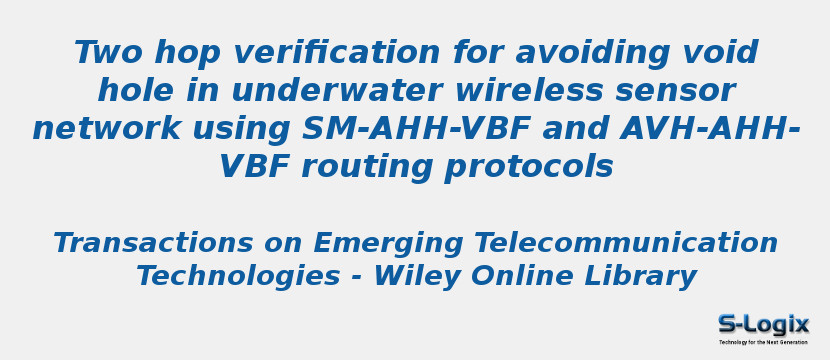Research Area: Wireless Sensor Networks
Underwater Wireless Sensor Networks (UWSNs) consist of several sensor nodes deployed underwater and gathering information from the underwater situation. Sometimes during a communication void regions occur when a forwarder node is unable to find the next forwarder node closer to the sink within the transmission ranges which results from its took extra energy consumption. In this research work, we intend schemes for void hole avoidance. First one is, Avoiding Void Hole Adaptive Hop by Hop Vector-Based Forwarding (AVH-AHH-VBF) in an UWSN, and the second, scheme for increasing lifetime and minimizing consumption of energy of the network, Sink Mobility (SM-AHH-VBF). Simulation results show that our schemes outperform compared with baseline solution in terms of average Packet Delivery Ratio (PDR), Average Propagation Distance (APD), energy consumption. The simulation results verify the AVH-AHH-VBF scheme results is equals to 14% and SM/AHH-VBF equal to 32% in terms of PDR, AVH-AHH-VBF equals to 57% and SM equals to 39% for energy consumption, AVH-AHH-VBF had a tradeoff of 63% because of considering two hops and SM equals 20% tradeoff for the average delay and AVH-AHH-VBF equals 35% and SM equals 61% improvement for average APD.
Keywords:
Author(s) Name: Tariq Hussain, Zia Ur Rehman, Arshad Iqbal, Khalid Saeed, Iqtidar Ali
Journal name: TRANSACTIONS ON EMERGING TELECOMMUNICATIONS TECHNOLOGIES
Conferrence name:
Publisher name: Wiley
DOI: 10.1002/ett.3992
Volume Information: Volume31, Issue8 August 2020
